Zero Waste Living Guide
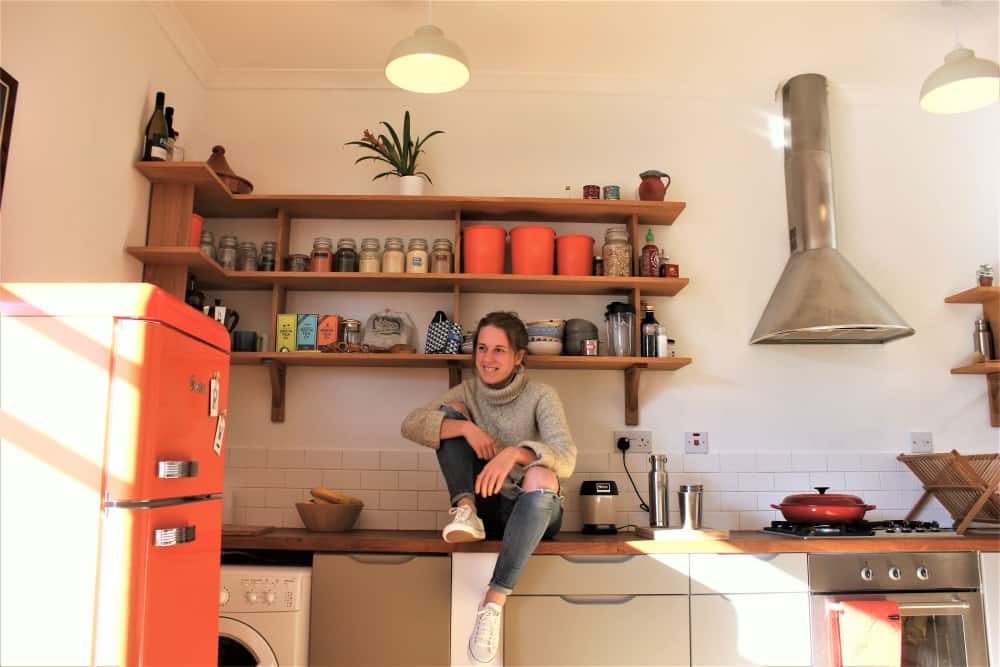
Zero waste living and reducing plastic waste is always on our mind. We’ve tried hard to cut down our plastic use during our travels over the years. Now we’re learning more and more about the zero waste lifestyle whilst living in the UK. We’ve just bought our first apartment in Brighton and decided that we want to have a zero waste home here.
Zero waste living means reducing your plastic waste and minimising the amount of rubbish which is sent to landfills. A plastic bottle can take 450 years to decompose and a plastic bag 1000 years — crazy. Living zero waste focuses on the three Rs: reduce, reuse, recycle. This zero waste living guide features products to minimise plastic waste, and tips to reduce, reuse and recycle.
We’re only just learning about zero waste living and reducing plastic waste. If you have any zero waste living tips or ideas for us then please share them in the comments section of this post.
Zero Waste Kitchen
Food Wrap and Storage — We’ve stopped using foil and cling film and instead opted to wrap and store our food in plastic-free ways. Most of our food is stored in hand-me-down orange Tupperware from my grandma. Any leftovers to go in the fridge or come with us for lunch go into our stainless steel Elephant Box. We use Boc’n’Roll to wrap sandwiches, flapjacks and other dry foods.
Recycling — Brighton and Hove council collect recycling across the city and there are communal recycling points all over. We live in a flat, so we use communal recycling points on our street to recycle our cardboard, tins, bottles and so on. We keep hold of glass jars and reuse these to store spices and dried foods on our kitchen shelves.
Composting — We’re part of a community composting programme run by the Brighton and Hove Food Partnership. Unfortunately flats in Brighton aren’t able to compost as easily as they can recycle. Instead, this initiative has community composting bins at various points in Brighton. Our nearest point is in Norfolk Square Gardens. How does it work? Well there are wooden compost bins which have a code lock. Once you join a group, they’ll let you know the code and you can add your raw waste to the compost.
Takeaways — We love cooking but sometimes we like a cheeky takeaway. We soon realised that some takeaways are delivered in plastic boxes and plastic bags. We’ve decided that when we get a takeaway, we’ll opt for restaurants that don’t use plastic takeaway boxes. Instead of Indian and Thai takeaways, we often get pizza because we can recycle pizza boxes!

Zero Waste Food Shopping
Reusable Bags — Reusable bags are a big way we reduce our plastic waste. That stat about a plastic bag taking 1000 years to decompose has made sure we never take plastic bags from supermarkets and stores. We don’t take plastic bags when buying fruit and veg, and instead just wash our produce when we get home.
Local Veg Box — We’ve recently signed up to a home-delivered veg box from Simply Veg in Brighton. They deliver seasonal, locally produced vegetables each week. We’ve not had our first order yet, so we’ll let you know how it goes.
Bread — For bread, we mostly buy chewy brown loaves from the Real Patisserie or loaves from supermarket bakeries. This way we can avoid the plastic wrap from pre-packaged sliced bread.
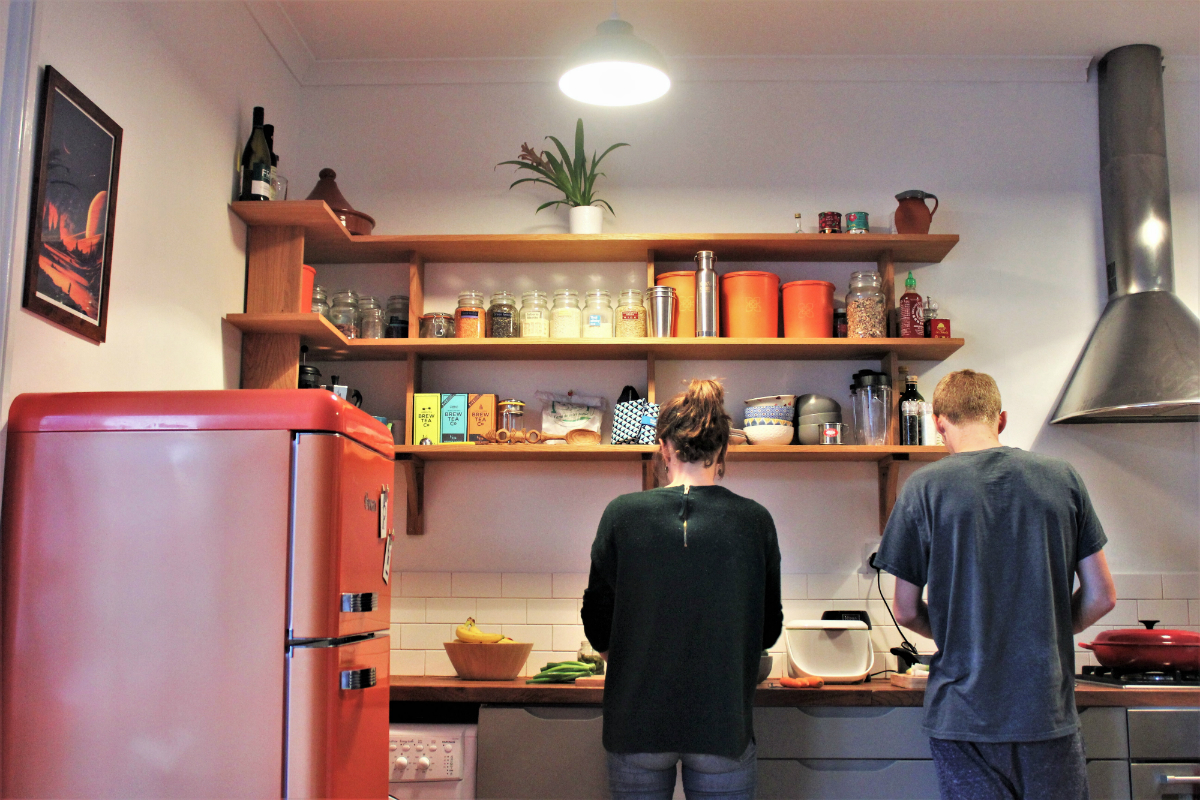
Zero Waste Picnics and Outside
When we’re taking food to eat out, we use the storage containers and food wraps we mentioned above. We’ll often take food from home to avoid plastic wrapping that lunch foods and takeaway food comes in.
Water Bottles and Cups — We love a weekend picnic or spending a summer evening on the beach with friends. But we became conscious of plastic water bottles and plastic cups that make an appearance when there’s a bottle of wine to share. Our alternatives are this Klean Kanteen water bottle and these Klean Kanteen stainless steel pint cups. They’re both non-toxic and contain no plastic!
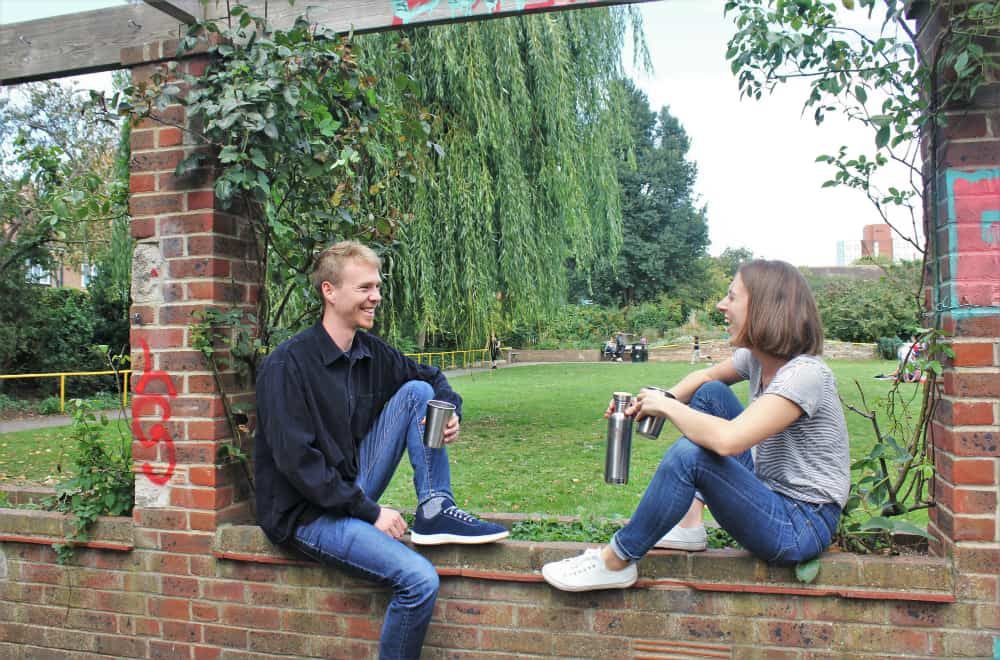
Eco-Friendly Gas and Electric
Gas and electric is a biggie when you get your own place. We switched over to Bulb, an eco-friendly gas and electric supplier. Bulb supply 100% renewable electricity and 10% green gas. They buy energy from independent renewable generators from across the UK. The other handy thing about Bulb is that all their customers are given the best price tariff. There are no packages or lock-ins. We also opted for paperless bills too and can manage everything from within our online dashboard.
Zero Waste Bathroom
Toilet Roll — You might not have thought about it before, but we cut down a bunch of trees to wipe our bums with. We’ve switched to environmentally-friendly loo roll from Who Gives A Crap. Their toilet roll is made from 100% forest friendly bamboo, meaning no trees are cut down. They also don’t use inks, dyes or scents.
The rolls are delivered in a large box (of 48 rolls) and are individually paper wrapped. We compost the paper wrapping. Even better, Who Gives A Crap donate 50% of their profits to build toilets for the 2.3 billion people (roughly 40% of the world’s population) who don’t have access to a toilet.
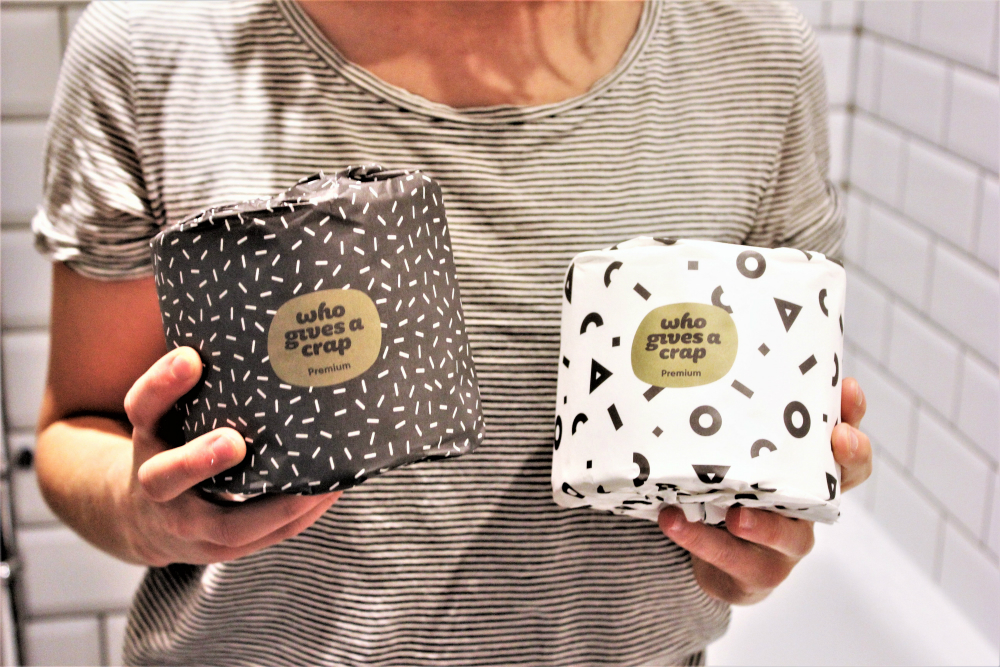
Bamboo Toothbrush — Forget throwing out a plastic toothbrush every 6 months. We’ve moved over to using eco-friendly bamboo toothbrushes instead. Watch out for ones where the bristles are made of plastic and try to get completely recyclable ones like the sustainable ones from Unwrpd, a zero waste delivery box.
Truthpaste Toothpaste — Toothpaste is another bathroom necessity that comes in plastic! Instead, try truthpaste, a natural mineral toothpaste which comes in a jar. Just put some on your toothbrush and brush as normal. You can get truthpaste as part of Unwrpd’s delivery box.
Soap and Soap Pouch — I’m currently using natural lemongrass essential oil soap and a soap pouch from Unwrpd. The soap is moisturising and the soap pouch means more foam is produced and it’s rough sisal material helps remove dead skin.
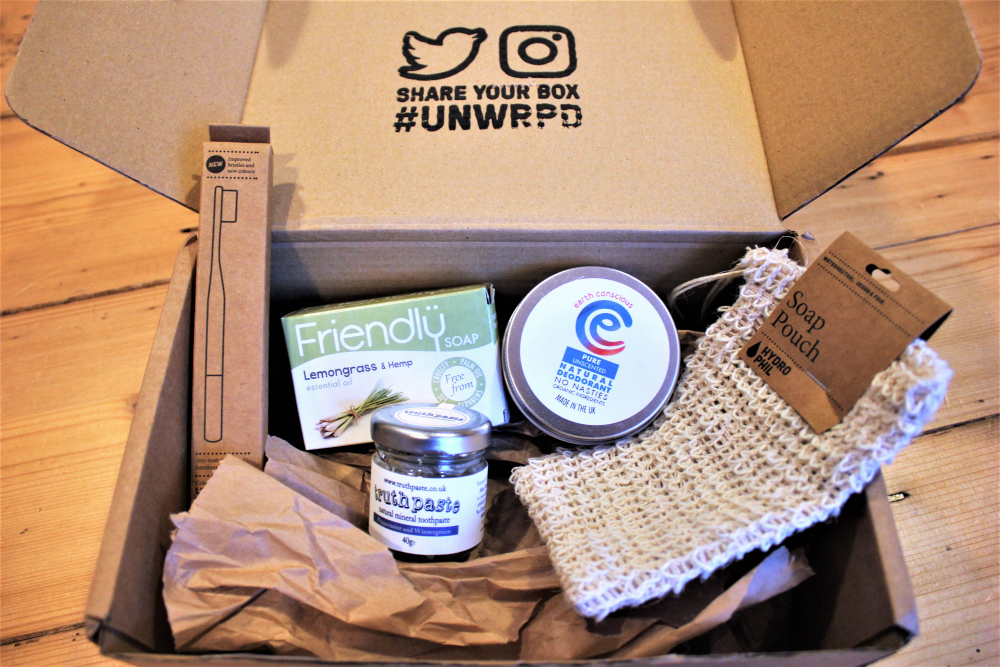
Shampoo — We’ve replaced our plastic shampoo bottles with shampoo bars from Lush. One shampoo bar lasts for 70 hair washes and it lathers up like a dream. If you’re travelling, these also take up minimal packing space, last for ages and aren’t flagged as liquids when you’re going through airport security.
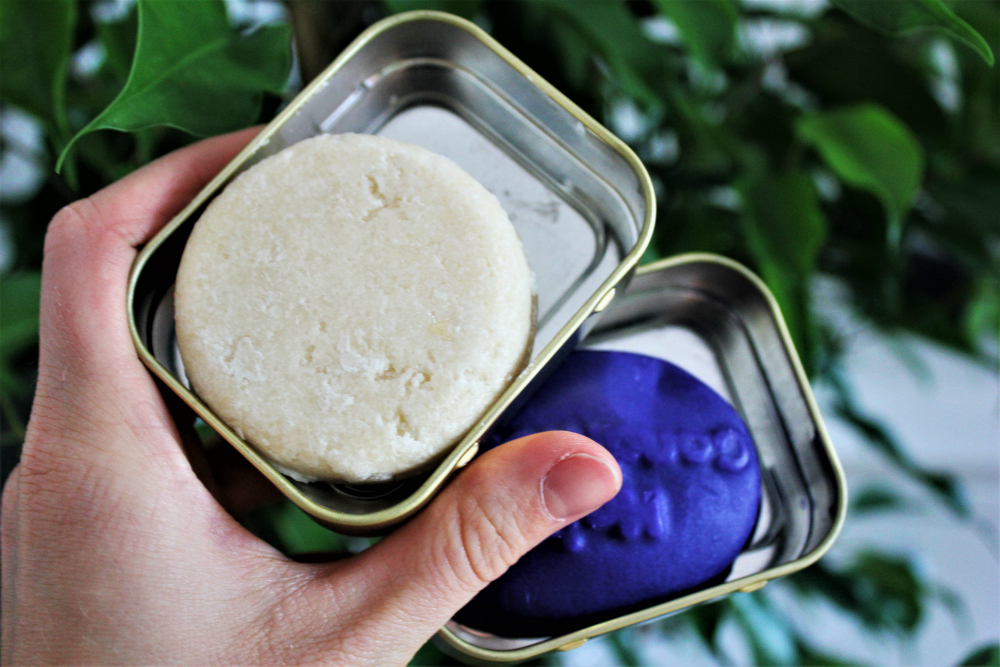
Natural Deodorant — I use the amazing Lamazuna Natural Deodorant that came in my travel pack from Naked Pinecone. I’ve tried a few natural deodorants and this is by far the best when. It has a chalky texture, is friendly on skin and isn’t sticky. There’s no plastic packaging and all products from Naked Pinecone are zero waste, including this deodorant, shampoo cubes, lip balm and Shade sunscreen.
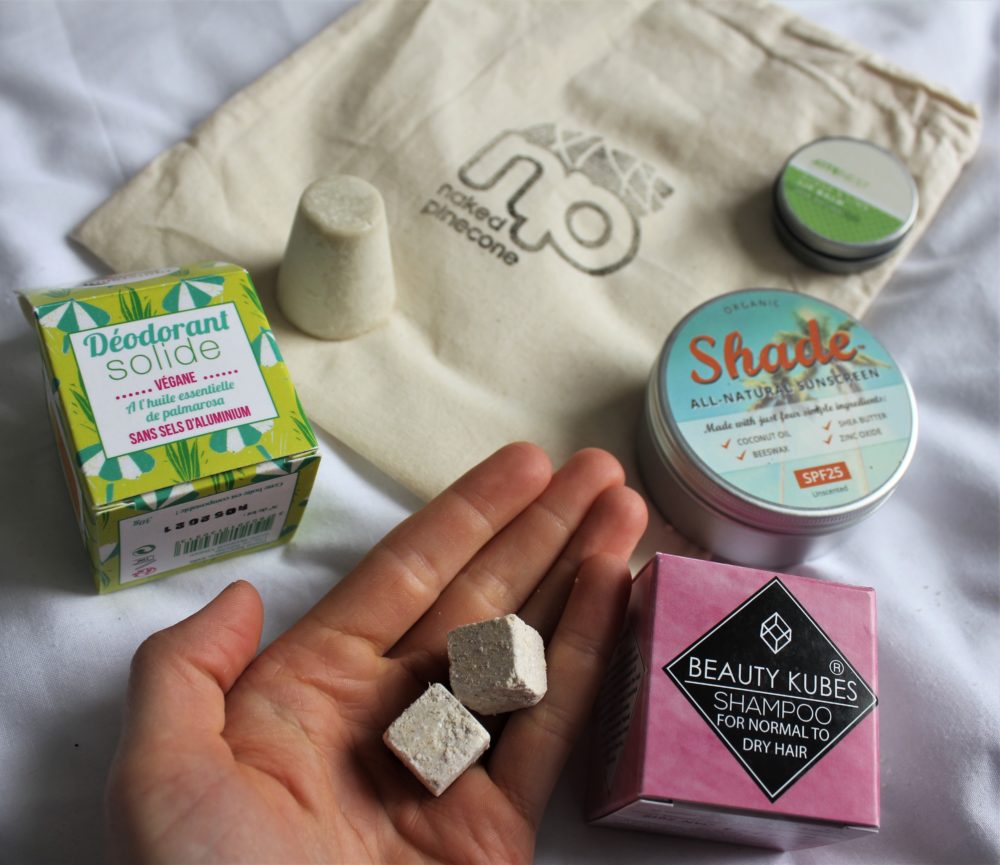
Safety Razor — I’m not sure why society started using plastic disposable razors instead of stainless steel razors. We throw away over 2 billion disposable razors a year! I bought this Weish safety razor from Amazon and got some replacement blades from Boots.
Sanitary Products — You all know I’m a huge proponent of the Mooncup (it comes in two sizes — A and B). Tampons and sanitary pads produce over 100 billion pieces of waste each year and 80% of single-use period products contain synthetic materials and plastics. Aside from the environmental cost, do you really want those plastics and chemicals inside you?
If you’re uncomfortable with the idea of Mooncups, then there are other options out there including period pants and non-toxic tampons. I also have a pair of Thinx hiphuggers (I had to pay a whopping £13.50 import tax on them though!) which I wear overnight.
Zero Waste Cleaning Products
Traditional cleaning products have long been known to be full of toxic chemicals that can irritate skin and be harmful for your health. We’re trying out a few different eco-friendly cleaning products, including Method and Ecover. Our favourites have been Method’s all-purpose spray and their washing-up liquid. Method’s products have recycled and recyclable packaging, and their ingredients are responsibly sourced and biodegradable.
Instead of kitchen roll and disposable green kitchen sponges, we’ve opted for reusable kitchen sponges which we can toss in the washing machine and re-use. We’ve also got a vegetable brush that we use to rub off dirt and kiwi hairs (you can eat them skins on if you rub the hairs off) instead of a scourer.
Zero Waste Bedroom
Pillows — We didn’t find a way to get our bedroom essentials without plastic wrap. However, we did avoid pillows and duvets which use duck or goose down (yes, unfortunately when down is used it means the animals are factory-farmed and slaughtered). Instead our pillows have hollow fibre filling made entirely from recycled plastic bottles. Our pillows are lush as well, so highly recommend.
Mattress — Our mattress is the eco-friendly bamboo mattress from Happy Beds. The fabric is bamboo yarn, a natural hypoallergenic and biodegradable. Unfortunately, the mattress did come in plastic wrap. Be aware that if you buy from this brand, there is no free returns policy.
Second Hand Household Items
Freecycle — Freecycle was our saviour when we first moved into our flat. We managed to get a large box of nearly new kitchenware including pots, pans, utensils and a coffee grinder for free. Good items can go quick on Freecycle but it’s a great place to get furniture and other bits and bobs second hand.
Charity Shops in Brighton — The London Road charity shops are well-known for being the ones to go to for second hand furniture. We bought a large mirror from Cancer Research over there. Also check out the The Recycled Wood Store over that side of town.
Flea Markets in Brighton — Brighton is full of fabulous flea markets where you can pick up furniture, picture frames, mirrors and all sorts. We often frequent Brighton Flea Market in Kemptown and the Saturday Outdoor Flea Market in the Lanes. Other popular flea markets and second hand stores are Snooper’s Paradise and North Laine Antiques.
Second Hand Bikes in Brighton — I bought a nifty second hand bike from Cranks in Brighton. They’re a DIY bicycle workshop run by volunteers and it’s a not-for-profit. They help you out with bicycle repairs and do up old bikes and sell them on. There’s a real community atmosphere here and lots of kids learning to fix up bicycles and scooters. They regularly update their Facebook page with second hand bikes for sale.
Buyerarchy of Needs
As part of our zero waste living endeavour, we’ve been thinking a lot more about what we’re buying and whether we really need it. We’ve always been minimalist types because travelling around the world with just a 30L backpack means you don’t have space for too much.
Keen to avoid cluttering our flat with useless junk that comes with plastic by-products, we’ve been using Sarah Lazarovic’s ‘Buyerarchy of Needs’. This buying pyramid encourages you to try all the alternatives before buying something new. Basically, “buying” is only done when all other options (use, borrow, swap, thrift, make) are exhausted. Even when we get up to buying, we try to buy second hand from charity shops and flea markets before we buy new.
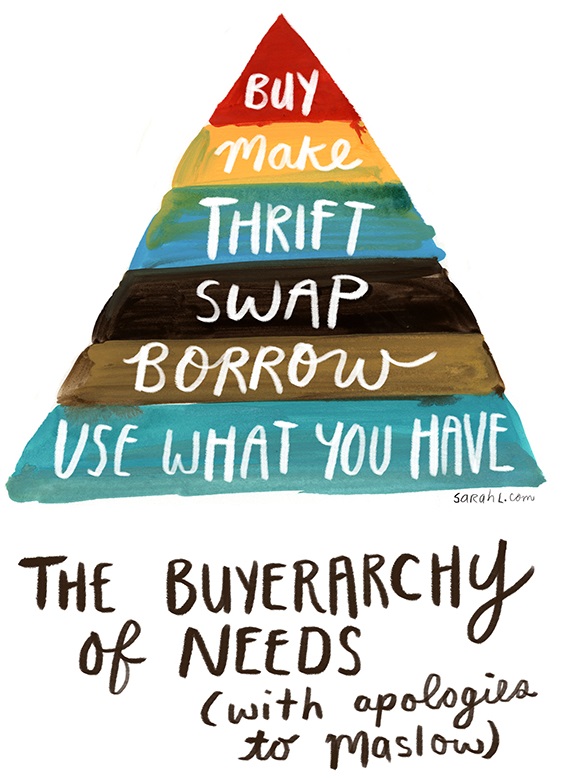
Share Your Zero Waste Living Tips
We’d love to here more ideas for zero waste living and reducing our plastic waste! Whether you’re a zero waste pro or an anti-plastic pioneer, we’re always keen to have more tips and ways to improve. Please share your thoughts in the comments below, we’d really appreciate it.
If you live in Brighton, then let us know! We’d love to meet you for a coffee and to chat more about the environment, cutting out plastics and living clean and green.
LIKE IT? PIN IT!
This post contains products provided to us by a few generous brands who care about the environment and wanted to help us on our zero waste journey. We only ever write our honest opinions of the products we use and wouldn’t recommend our readers any items we don’t personally love.
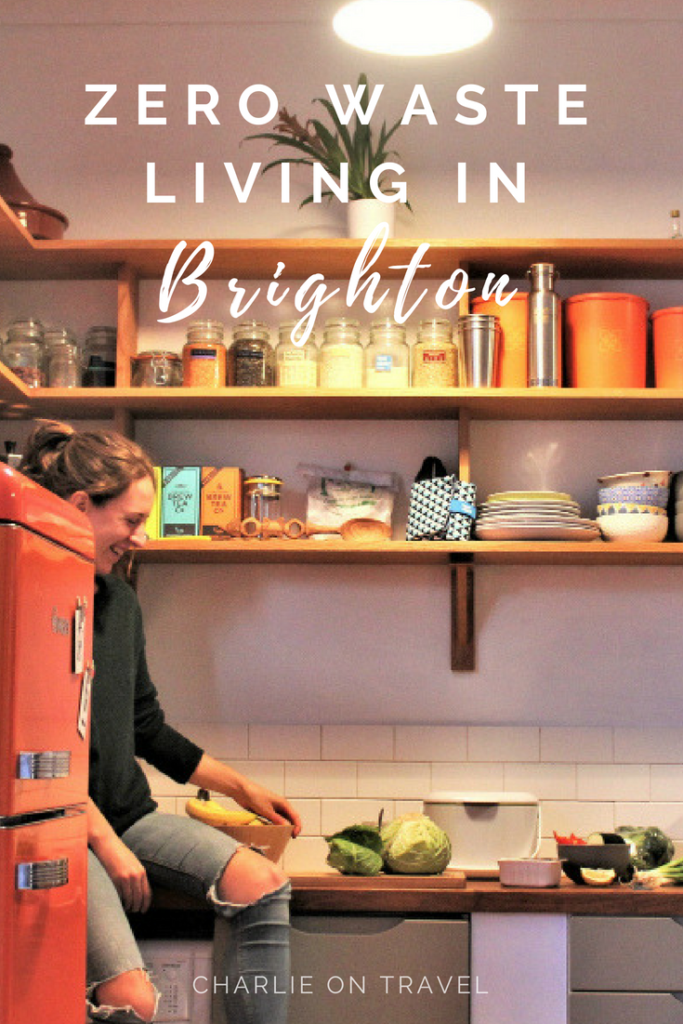
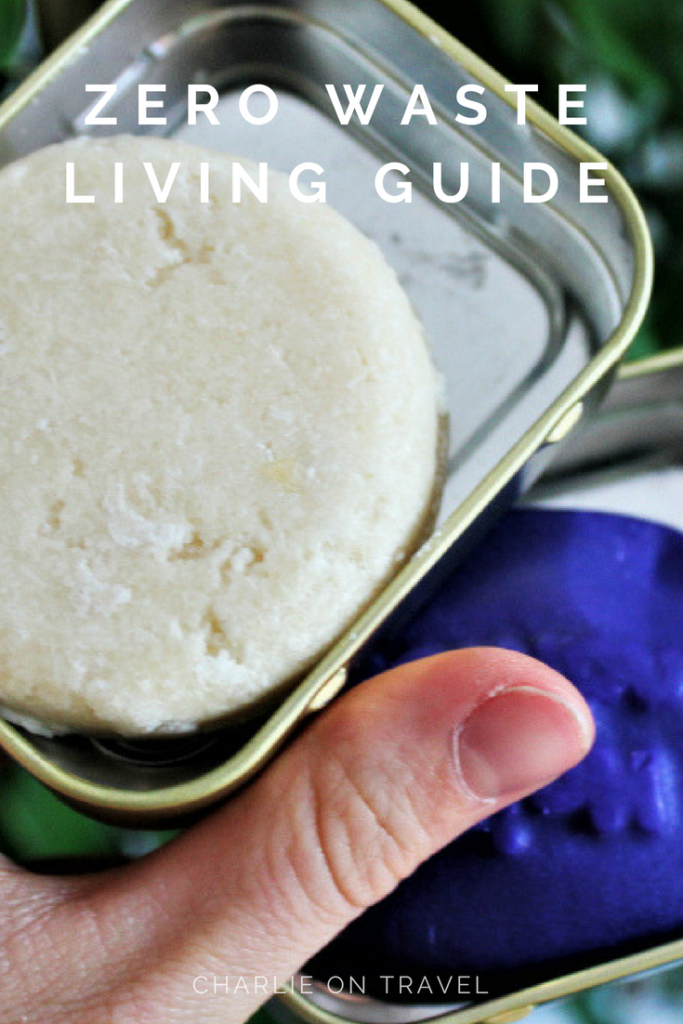
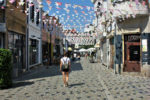
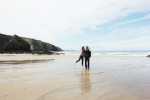
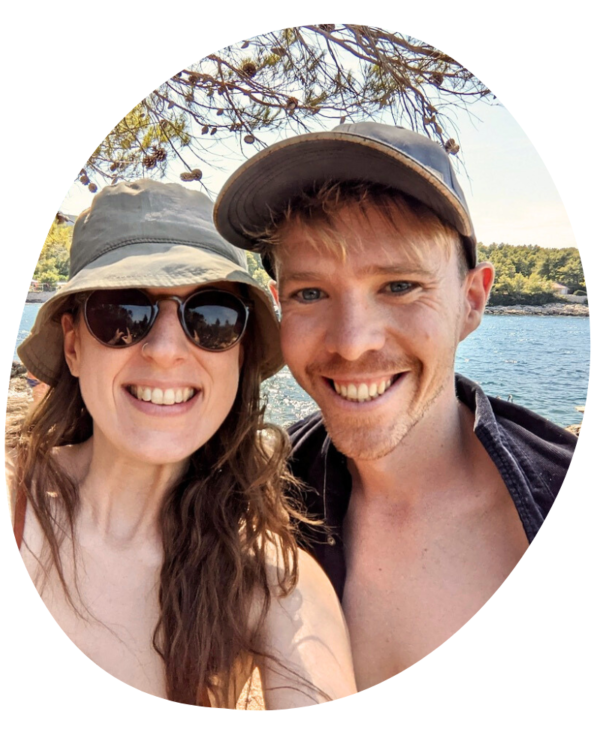


Liv
Hey, so I’m curious to know what you do (or what you’d suggest doing!) with packaging such as crisp packets, because things like this these never seem to be recyclable and I don’t know how to get around it! Thanks :)
Sharon
I love this piece and the fact that you’re trying to do your little bit. If we all take responsibility, make a change in our lives, together we can make a big difference.
Apparently the supermarket Morrisons have done away with all plastic packaging and use paper bags.
Nomad Bears
With all that in mind, how much rubbish do you end up producing? What about the packaging or when vegetables are out of season at the market? It’s a great article and I think we should all be living waste-free as much as possible.
Charlie Marchant
Hi Jesse, currently we’re producing under a small 5L bin worth of rubbish per week. This includes mostly packaging from products received in the post (such as via Amazon), packaging from large bags of rice, oats and other grains (we’re yet to find a bulk place in Brighton where we can refill without having to buy these plastic wrapped and odd bits like avocado stones and date pipes which we’re not able to compost at our community compost scheme (because they take too long to biodegrade in the small compost area). We’re working week-by-week to reduce it, focusing on resolving each plastic waste issue as we go. In terms of out of season vegetables and fruits, we’ve actually just stopped buying them. We enjoy experimental cooking, so we’re happy just to cook with what we have in our veg delivery box and can get at the grocers or market.
Amy
Hi Charlie!
I love this post. How does your bakery bread come packaged? Is it in paper? A lot of the bakeries I went to sadly used plastic.
I have two tips to add to here: i just gave up using baby wipes as a facial cleanser and switched instead to using Norwex microfibre cloths and coconut oil, do you do something similar?
Also, there are companies that send weekly boxes of “ugly produce” i.e. produce that doesn’t pass EU laws (or laws of whatever country you’re in) that farmers still want to sell, and often for cheaper. It’s still totally fine, fresh, and lovely. Also, I heard Lidl, Asda, Morrison’s, and Tesco sell similar produce between 8am and 10am if you ask for it. You pay a flat fee for a box of assorted stuff. If they don’t sell it by 10am they give it to a food bank.
I love the shampoo bars idea, will definitely be buying those next, and trying out the deo and toothpaste. I asked for lots of eco-friendly goodies for my xmas list, including those beeswax wrappers, bamboo toothbrushes, and metal straws. I’m also thinking of buying these for gifts too…any way to spread the word!
Charlie Marchant
Hey Amy,
Yes bread from the Real Patisserie near where I live comes in paper.
Excellent idea. I don’t wear makeup or use baby wipes, but I’ve noticed my family (who I don’t live with) use them a lot, so I had been thinking about what alternatives might be.
I’ve heard about “ugly produce” but haven’t seen a scheme near me doing it. I also never go to the supermarkets either so wouldn’t have a chance of getting it! Any more info on the companies who do those weekly boxes would be great though.
That’s awesome – let me know the update after Christmas on your goodies and which ones you test out! I’d love more recommendations :)
Vasanthi Chari
Hi Charlie.My name is Vasanthi. I’m from India.Recently I moved from capital New Delhi to Chennai which is the Southern part of India. Here from January 1st total ban on plastic bags have been imposed and so people are now forced to use only eco friendly bio degradable materials which is very good and now only awareness has started and lots of people r realising the importance of sustainable development. I really admire and appreciate the way you are planning each and everything ,being minimalist is not an easy joke. Here in our south India we use mostly everything in stainless materials. Whether it be plates or cups glasses and paddles everything including storage containers is made up of stainless steel. For parties and travelling we have the eco friendly banana leaves, palm leaf cups and plates which are machine pressed very neat and clean recyclable and biodegradable. So there are plenty of ways to protect our nature and Mother Earth for our future generations to lead a healthy life. Since we are vegetarians we hardly have much waste and all the peels go to the cattle which are roaming all over the city in search of food. So basically all my food waste does not actually go waste.Its being taken by another living being. We always keep lot of cloth bags in all sizes for our groceries and vegetables. Since I take only Organic food we mostly visit the shop once in a month to buy all the requirements.For oils we have the steel cans which do not spill when we bring it by car. I’m sure when more and more youngsters line you share these people will start thinking seriously about all these and the nature’s fury can be contained with judicious use of things.
Charlie Marchant
Hi Vasanthi, lovely to meet you and thank you for your thoughtful and detailed comment. It’s great to hear that the plastic bag ban is taking place – I wish that the UK would do the same! Government action is so important in educating people and raising awareness around environment concerns. Stainless steels containers are excellent options, I love mine. When I have travelled, I’ve also used banana leaves and palm leaves but unfortunately we don’t have anything similar to this in the UK – I love how other people are able to use nature’s resources in this way. The steel cans for oil sounds very good! Where I live in Brighton, I have not found a place to buy oil with a bring-your-own tub and here it is always sold in plastic bottles.
Dominika
Hi, I was just wondering… Do you think Truthpaste would be classified as liquid at the airport security?
Charlie Marchant
Good question! It would likely be classes as a liquid considering that jam and other thick substances are counted as liquids. I believe Truthpaste often comes in 40g containers, which would be under the 125ml limit for carry-on so safe to have in your carry-on bag.